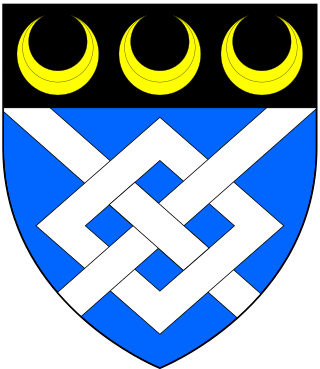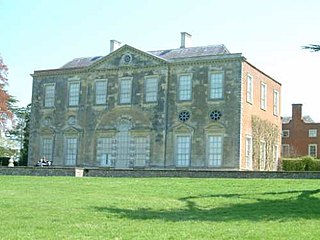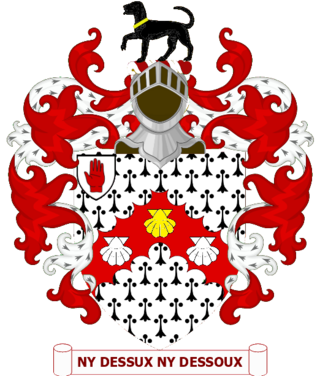Notes
This article needs additional citations for verification .(February 2013) |
- ↑ "Official Roll of the Baronetage (as at December 31st 2012". Standing Council of the Baronetage. Archived from the original on 6 March 2015.
There have been four baronetcies created for persons with the surname O'Brien, one in the Baronetage of Ireland and three in the Baronetage of the United Kingdom.
The O'Brien Baronetcy, of Leaghmenagh in the County of Clare, was created in the Baronetage of Ireland on 9 November 1686; for more information see Baron Inchiquin.
The O'Brien Baronetcy, of Merrion Square in Dublin and Boris-in-Ossory in Queen's County, was created in the Baronetage of the United Kingdom on 25 September 1849 for Timothy O'Brien. He was a merchant, Lord Mayor of Dublin and Liberal Member of Parliament for Cashel. The second Baronet represented King's County in the House of Commons as a Liberal for over thirty years. The third Baronet was Lord Lieutenant of County Cork. The baronetcy has been considered dormant since the death of the 6th baronet in 1982 as the presumed 7th baronet does not appear on the Official Roll of the Baronetage.
The O'Brien Baronetcy was created in the Baronetage of the United Kingdom on 28 September 1891; for more information see Baron O'Brien.
The O'Brien Baronetcy was created in the Baronetage of the United Kingdom on 15 January 1916; for more information see Baron Shandon.
Holders and intermittent generations:
The baronetcy is presently considered Dormant as the present holder has not proven his claim to the title. [1]
The heir presumptive after the presumed-only holder is the other patrilineal grandson of the 6th Baronet, James Patrick O'Brien (born 1964).
This article needs additional citations for verification .(February 2013) |

Baron Inchiquin is one of the older titles in the Peerage of Ireland. It was one of two titles created on 1 July 1543 for Murrough O'Brien, Prince of Thomond, who was descended from the great high king Brian Boru. The grant of the English titles was conditional upon the abandonment of any Irish titles, the adoption of English customs and laws, pledging of allegiance to the Crown, apostasy from the Catholic Church, and conversion to the Church of England. Murrough was made both Earl of Thomond in the Peerage of Ireland, with remainder to his nephew Donough O'Brien and Baron Inchiquin, with remainder to his male heirs.

There have been three baronetcies created for people with the surname Hood, one in the Baronetage of Great Britain and two in the Baronetage of the United Kingdom. The first Baronet of the first creation was made Viscount Hood, while the fourth Baronet of the second creation was made Baron St Audries.
There have been four baronetcies created for persons with the surname Leslie, one in the Baronetage of Nova Scotia, one in the Baronetage of Ireland, one in the Baronetage of Great Britain and one in the Baronetage of the United Kingdom. Three of the creations are extant as of 2010.

There have been three baronetcies held by persons with the surname Verney, one in the Baronetage of England and two in the Baronetage of the United Kingdom. Two of the creations are extant as of 2016.

There have been two baronetcies created for persons with the surname Nelson, both in the Baronetage of the United Kingdom. Both creations are extant as of 2010.
There have been five Baronetcies created for people with the surname Forbes, four in the Baronetage of Nova Scotia and one in the Baronetage of the United Kingdom. The first holder of the Burn Baronetcy of Jessfield, created in the Baronetage of the United Kingdom in 1923, assumed the surname of Forbes-Leith of Fyvie in 1925.

There have been four baronetcies created for persons with the surname Hope, three in the Baronetage of Nova Scotia and one in the Baronetage of the United Kingdom. As of 2010 one creation is extant, one dormant and two extinct.
There have been two baronetcies created for persons with the surname Joseph, both in the Baronetage of the United Kingdom. One creation is extinct while one is extant.
The Stephenson Baronetcy, of Hassop Hall in the County of Derby, is a title in the Baronetage of the United Kingdom. It was created on 16 July 1936 for the businessman and politician Henry Kenyon Stephenson. The second baronet was also a businessman and a Lieutenant-Colonel in the Territorial Army. As of 2007 the presumed third holder of the title has not successfully proven his succession and is therefore not on the official roll of the baronetage, with the baronetcy considered dormant. For more information, follow this link.
There have been three baronetcies created for persons with the surname Noble, all in the Baronetage of the United Kingdom.
There have been eight baronetcies created for persons with the surname Jackson, one in the Baronetage of England, one in the Baronetage of Great Britain and six in the Baronetage of the United Kingdom. As of 2014 four of the creations are extant.
The Goulding Baronetcy, of Millicent in Clane in the County of Kildare and Roebuck Hill in Dundrum in the County of Dublin, is a title in the Baronetage of the United Kingdom. It was created on 22 August 1904 for the businessman William Goulding, a prominent freemason who was director several railway companies in Ireland, and son of William Goulding (1817–1884), the last Conservative MP for Cork City. He accompanied the Church of Ireland Archbishop of Dublin John Gregg and Bishop of Cashel Robert Miller "to see Michael Collins in May 1922, following the murders of thirteen Protestants in the Bandon valley, to ask whether the Protestant minority should stay on. Collins 'assured them that the government would maintain civil and religious liberty'."
There have been four baronetcies created for persons with the surname FitzGerald, one in the Baronetage of Ireland and three in the Baronetage of the United Kingdom.

There have been seven baronetcies created for persons with the surname Russell, three in the Baronetage of England and four in the Baronetage of the United Kingdom.

There have been two baronetcies created for persons with the surname Lucas: one in the Baronetage of England and one in the Baronetage of the United Kingdom.
There have been four baronetcies created for persons with the surname Morris, all in the Baronetage of the United Kingdom. As of 2014 two of the creations are extant.

The Grove Baronetcy, of Ferne House, in the parish of Donhead St Andrew in the County of Wiltshire, is a title in the Baronetage of the United Kingdom. It was created on 18 March 1874 for Thomas Grove, Liberal Member of Parliament for Wiltshire South and Wilton.
Three Baronetcies have been created for persons with the surname Johnson: one of New York in 1755 in the Baronetage of Great Britain, and then one of Bath (1818) and one of Dublin (1909), both in the Baronetage of the United Kingdom. As of 2010 the Johnson baronetcy of Bath is dormant, and that of Dublin is extinct.
There have been two baronetcies created for persons with the surname Falkiner, one in the Baronetage of Ireland and one in the Baronetage of the United Kingdom. As of 2014 one creation is believed to be extant.
There have been three baronetcies created for persons with the surname Maitland, two in the Baronetage of Nova Scotia and one in the Baronetage of the United Kingdom. Two of the creations are extant as of 2008 while the other is either dormant or extinct.